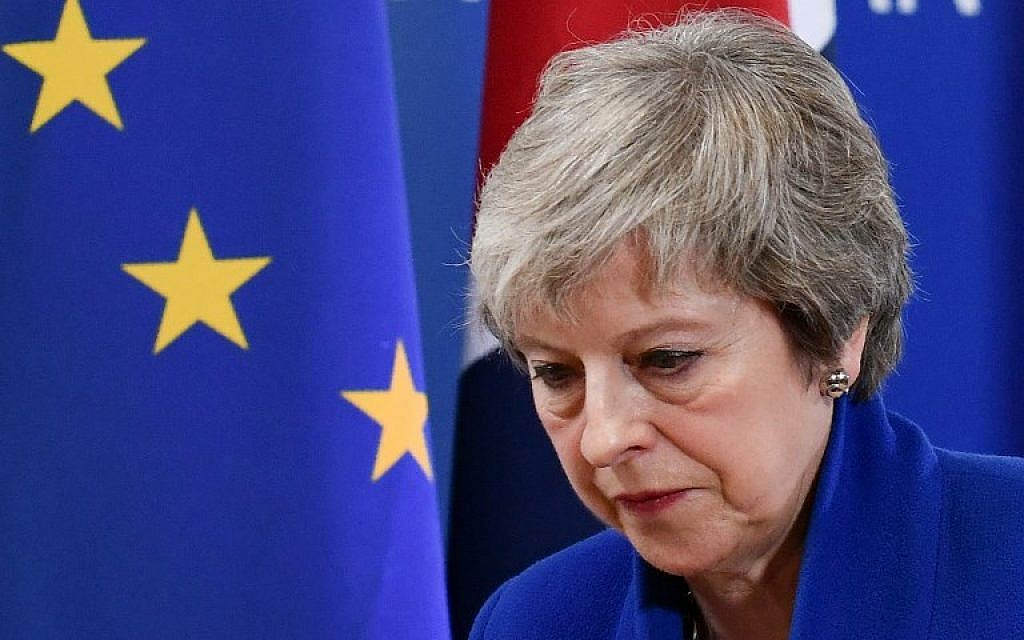May under assault over EU exit deal

British Prime Minister Theresa May faced parliamentary fury on Monday as she set off on the tricky task of convincing mutinous lawmakers to back her EU divorce deal. The British leader on Sunday crowned 17 months of painful talks with Brussels by sealing Brexit arrangements with the 27 other EU heads of state and government.
But this tortuous chapter on ending Britain's 45-year involvement in the grand European project was always going to be the easy part. May must now navigate the Brexit agreement through a divided chamber in which she holds the slimmest working majority - and where lawmakers oppose it on all sides. A vote has been set for December 11. The beleaguered leader got a taste of just how tough her job will be as she briefed lawmakers on the outcome of her Brussels visit. Opposition Labor Party chief Jeremy Corbyn called the 585-page document and its accompanying political declaration "an act of national self-harm".
"The prime minister may have achieved agreement across 27 heads of state, but she's lost support of the country," he said. Yet May might be more disconcerted by the seemingly growing and clearly more vocal chorus of resentment from within her own Conservative Party.
Conservative MP Mark Francois told May her deal was "as dead as a Dodo". Former May loyalist Michael Fallon said the government was asking parliament to "take a huge gamble" and "surrendering our (EU) vote and our veto without any firm commitment to frictionless trade". More than an hour passed during Monday's parliamentary session before the first member of her own party stood up to voice support for the premier. The British pound gave up all its morning gains against the dollar over the course of May's appearance in parliament.
- 'Get on with it' -
The latest vote counts conducted by British media are not stacking up in May's favor. Many expect the deal to fail the first time around and for May to call a second vote on more or less the same set of arrangements before the chamber breaks for the winter holidays.
Britain would be entering unchartered waters - and quite possibly new elections - if the package fails a second time around. Brexit enters into force on March 29 and May's government is also making "no-deal" preparations just in case.
May argued on Monday that voters were simply exhausted with Brexit and just wanted their leaders to get things resolved once and for all. "The British people want us to get on with a deal that honors the (2016 Brexit) referendum and allows us to come together again as a country, whichever way we voted," May said.
"This is that deal. A deal that delivers for the British people." EU foes in her Conservative Party accuse May of ceding too much to Brussels while the Labor opposition argues that the deal will devastate the British economy. But both Brussels and May said the deal now on the table is final - and the best one Britain can get. "We don't want to give the wrong impression to people, whether they are passionate Remainers or passionate Brexiteers, that there is another agreement that can command the support of 28 member states. There isn't," Irish Prime Minister Leo Varadkar said.
- Poorer Britons? -
May will now embark on an intensive campaign to promote her vision with voters across the country and lawmakers in London. The government held a special briefing on the Brexit arrangement for Labour MPs - an unusual but not unprecedented move. May will also meet over 100 big business leaders to seek their support, But Corbyn on Monday seized on a fresh study showing British growth slowing sharply under the plan prepared by May's government.
The independent National Institute of Economic and Social Research found that trade with the EU - especially in services - was likely to be more costly after Brexit and have an adverse effect on living standards. "GDP in the longer term will be around four percent lower than it would have been had the UK stayed in the EU," the report said. It estimated that the loss equaled around o1,000 per year per person.
